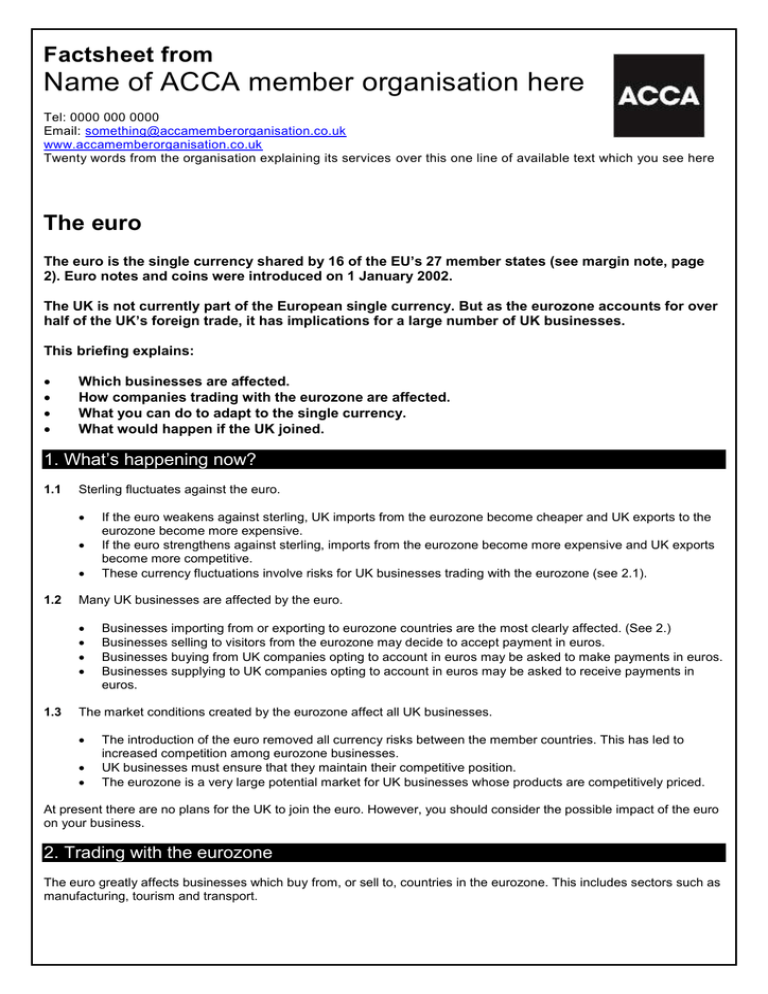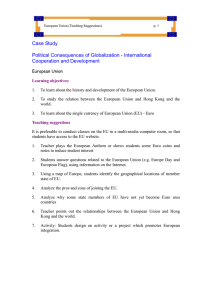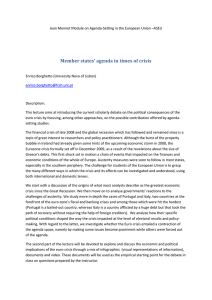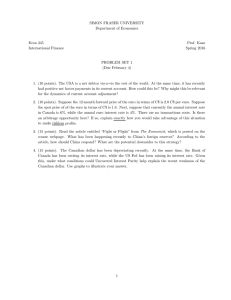
Factsheet from
Name of ACCA member organisation here
Tel: 0000 000 0000
Email: something@accamemberorganisation.co.uk
www.accamemberorganisation.co.uk
Twenty words from the organisation explaining its services over this one line of available text which you see here
The euro
The euro is the single currency shared by 16 of the EU’s 27 member states (see margin note, page
2). Euro notes and coins were introduced on 1 January 2002.
The UK is not currently part of the European single currency. But as the eurozone accounts for over
half of the UK’s foreign trade, it has implications for a large number of UK businesses.
This briefing explains:
Which businesses are affected.
How companies trading with the eurozone are affected.
What you can do to adapt to the single currency.
What would happen if the UK joined.
1. What’s happening now?
1.1
Sterling fluctuates against the euro.
1.2
Many UK businesses are affected by the euro.
1.3
If the euro weakens against sterling, UK imports from the eurozone become cheaper and UK exports to the
eurozone become more expensive.
If the euro strengthens against sterling, imports from the eurozone become more expensive and UK exports
become more competitive.
These currency fluctuations involve risks for UK businesses trading with the eurozone (see 2.1).
Businesses importing from or exporting to eurozone countries are the most clearly affected. (See 2.)
Businesses selling to visitors from the eurozone may decide to accept payment in euros.
Businesses buying from UK companies opting to account in euros may be asked to make payments in euros.
Businesses supplying to UK companies opting to account in euros may be asked to receive payments in
euros.
The market conditions created by the eurozone affect all UK businesses.
The introduction of the euro removed all currency risks between the member countries. This has led to
increased competition among eurozone businesses.
UK businesses must ensure that they maintain their competitive position.
The eurozone is a very large potential market for UK businesses whose products are competitively priced.
At present there are no plans for the UK to join the euro. However, you should consider the possible impact of the euro
on your business.
2. Trading with the eurozone
The euro greatly affects businesses which buy from, or sell to, countries in the eurozone. This includes sectors such as
manufacturing, tourism and transport.
2.1
The fluctuating exchange rate between sterling and the euro exposes you to potential currency risk.
If you commit to sell at a price in euros and the euro weakens against sterling before you receive payment,
you will have lost out.
If you agree to buy at a euro price and the euro then strengthens before you pay, your purchase will cost
more.
Much of this risk can be reduced by slightly increasing your prices to cover potential losses.
But take care to keep your prices competitive.
2.2
If a high proportion of your sales or purchases expose you to currency fluctuations, consider ‘hedging’ your
currency risks.
You can also gain from exchange rate movements. The most important thing is to have a system to manage
currency fluctuations.
You should think about offering a euro price, at least as an alternative, to retain your longer-term
competitiveness.
A euro price makes price comparisons easy. Some prices will therefore vary less For example:
2.3
Customers can buy CDs from any country, using the Internet or direct mail. They can identify the least
expensive supplier.
Purchasers of ‘big ticket’ items, such as cars, can consider purchasing from abroad if price differences
warrant it.
Some goods and services cannot easily be purchased from abroad. These continue to cost significantly less
in some countries (eg perishables such as vegetables).
Your marketing materials may need to be amended to include prices in euros.
Consider quoting indicative euro prices in your sales literature.
To take account of possible exchange rate changes, add a note saying that the prices are ‘correct at the time of going
to press, but need to be checked when placing an order’.
Think about the implications of psychological pricing in euros.
Will you round up or down to set an attractive price?
For example, £2.99 could equal €3.43, but €3.39 may be a more attractive price.
2.4
You can make or receive payment in euros, exchanging to and from sterling, just as you would in any other
currency.
This includes credit and debit card payments.
Euro notes are available in denominations of €500, €200, €100, €50, €20, €10 and €5.
They are identical across the eurozone.
Euro coins are available in denominations of €2, €1, 50c, 20c, 10c, 5c, 2c and 1c.
Each coin has a standard side, which stays the same, and a national side, which varies according to the country of
issue.
All coins can be used anywhere in the eurozone.
If you do a lot of business with eurozone countries, consider opening a euro bank account (or a euro credit
card account).
2
2.5
If you make or receive a significant number of payments in euros, your financial and accounting systems should
be modified.
If your existing software permits you to record transactions in foreign currencies, adding the euro to your
system is easy.
If a substantial proportion of your business is done with eurozone countries, consider switching over to
accounting in euros.
But check you can make payments in euros as well as receive them.
Older computers may not recognise the € symbol. Consider using ‘EUR’ on invoices to signify euro amounts
instead of the symbol.
If you prepare your accounts in euros, under new UK regulations you will also be required to pay all UK taxes
and duties in euros. Ask your tax adviser for further information, as there is a transitional period for some
companies.
You can now pay all taxes and duties in euros, including arrears. But repayments of tax or duty due to you
must still be paid in sterling.
3. Dealing with the euro
3.1
Focus on the needs of your customers.
If your customers want to see prices quoted in euros, adjust your systems accordingly.
Talk to businesses you deal with.
Make sure you can cope with any changes they make to pricing, payments, or their electronic systems.
3.2
All new equipment and software should be compatible with the euro. Check before you make any new purchases
that it works with the euro and do not buy anything that is not compatible.
3.3
Find out what your competitors are doing.
You may not want to lead the field, but nor do you want to be left behind.
The introduction of the euro means major barriers between the national markets have come down. Businesses
are more exposed to overseas competition (and opportunities) than ever before.
Merger and acquisition activity is increasing on the continent. The ownership of some of your competitors there
may change.
3.4
Review your sales and pricing policies regularly.
3.5
Compare your prices with European and domestic competitors.
If your prices are competitive in Europe, the euro opens up trading opportunities, especially if it is easy for
consumers to see, compare and purchase your goods or services. For example, through your website.
Train employees to cope with the currency.
If you are likely to receive cash in euros, do you and your employees know how to deal with them?
Can you (and your employees) tell a genuine euro note from a counterfeit?
The highest denomination euro note in circulation is the €500, worth about £437.
Does everyone in your business understand the importance of avoiding confusion between the symbols €
and £?
Does everyone in your business know and understand the £ to € exchange rates?
Can they calculate how much change to give someone if necessary?
3
3.6
Talk to your bank.
3.7
Ask about the costs of setting up a euro account.
Establish the costs of changing euros into sterling and vice versa, and how long it will take.
Consider facilities for hedging your currency exposure, if it is likely to be significant.
Talk to your accountant to find out whether you need to amend your systems.
The adjustments to your systems are potentially complex and expensive.
It depends on what transactions you need to do.
3.8
Review your financing.
Cross-border competition between euro banks is increasing, pushing borrowing costs down. Also, euro
interest rates are generally lower than sterling interest rates.
If you want a euro-denominated loan, your bank is likely to require that you have a healthy euro-denominated
income.
4. If the UK joins the eurozone
If the UK joins the eurozone, there will be a transitional period. This may be shorter than many people expect. The
Government’s provisional plan estimates a total changeover time of 30 months from a ‘yes’ vote in a referendum to the
introduction of euro notes and coins.
4.1
All businesses will then be affected, not just those that have dealings with the eurozone countries.
4.2
The currency risk in dealing with the euro member countries will be eliminated.
UK businesses will be subject to the same interest rate regime as businesses in the other eurozone
countries.
A period of dual-pricing will probably precede the changeover. All prices would have to be given in both
sterling and euros.
The banks are working together to develop a code of good practice on the changeover of the currency. The likely
outcome is:
There will be no charge for converting funds in accounts.
There will be no charge for converting small amounts of notes and coins.
There is likely to be a charge for converting substantial amounts.
4.3
The banks will not apply ‘discriminatory’ charges (higher than those for sterling accounts) to euro accounts.
Vending machines, coin-operated machines and cash tills will all have to be adapted or replaced to handle the
euro.
Most tills can already deal with eurocheque and credit card payments.
The volume of cash circulating during the changeover period could cause problems.
5. Getting help
5.1
The Government provides free information for small and medium-sized businesses.
The HM Treasury website has factsheets and case studies for businesses considering trading in euros. See
www.hm-treasury.gov.uk/euro_business_index.htm.
To see images of euro banknotes, visit www.hm-treasury.gov.uk/euro_cash_notes.htm.
4
5.2
Contact your local business support or trade organisation for further guidance. Members and non-members can
also get advice from:
The Forum of Private Business (www.fpb.co.uk; 01565 634 467).
The Federation of Small Businesses (www.fsb.org.uk; 01253 336000).
The Enterprise Europe Network UK (www.enterprise-europe.co.uk/).
The effects of ‘eurocreep’
UK businesses are now living with the direct effects of the euro.
A.
A number of large companies in the UK now do much of their business in euros.
If you compete with them, your customers may require you to price in euros, so they can make comparisons.
If you do business with them, you may have to invoice or pay in the euro.
B.
All businesses based in euro countries have to conduct their business in euros.
C.
Cross-European tendering is now done in euros.
D.
For example, where the opportunity to compete has to be open to companies throughout the EU (eg
government or local authority tenders).
UK-based companies with overseas customers will find it advantageous to price in euros, as well as in sterling.
They will undoubtedly be asked to accept payment of invoices in euros.
E.
If your customers are mostly British, but might consider buying abroad (see 2.1), consider quoting in euros, so
that they can make direct price comparisons.
F.
The spread of the euro means that foreign exchange risk management is a serious issue for any company
trading with countries in or joining the eurozone.
Note
The 16 eurozone countries are Austria, Belgium, Cyprus, Finland, France, Germany, Greece, Ireland, Italy,
Luxembourg, Malta, Netherlands, Portugal, Slovakia, Slovenia and Spain.
Malta and Cyprus adopted the euro on 1 January 2008.
Bulgaria and Romania joined the EU on 1 January 2007.
Slovakia adopted the euro on 1 January 2009.
Hungary has announced its intention to adopt the euro by 2014.
Bulgaria, Estonia, Latvia, Lithuania and Bosnia and Herzegovina have all pegged their currencies to the euro.
Montenegro and Kosovo both also use the euro as their de facto currencies.
A euro is worth approximately 89p.
There are 100 cents (c) in one euro.
Experts’ quotes
“It is becoming increasingly obvious that market forces, rather than political will, are dictating the spread of the euro in
businesses (eurocreep), and it would be wise to assume that the UK will be more, rather than less, involved. Some
businesses in the UK have already lost money because staff were unaware of correct euro prices.”
Jim Redman,
5
Forum of Private Business
“Businesses preparing catalogues and sales literature should seriously consider whether euro prices should also be
included and, if so, what will happen should sterling fluctuate against the euro.”
Peter Bishop,
London Chamber of Commerce and Industry
Expert contributors
Thanks to Jim Redman (Forum of Private Business, 01565 634467); Peter Bishop (London Chamber of Commerce
and Industry, 020 7248 4444).
Further Help
Last reviewed 01.06.10
© BHP Information Solutions 2010. ISSN 1369-1996. All rights reserved. No part of this publication may be reproduced or transmitted without the
written permission of the publisher. This publication is for general guidance only. The publisher, expert contributors and distributor disclaim all liability
for any errors or omissions. Consult your local business support organisation or your professional adviser for help and advice.
6





